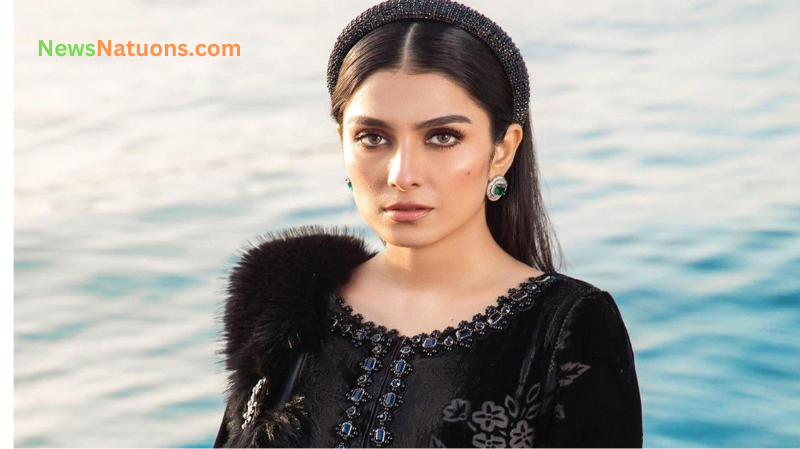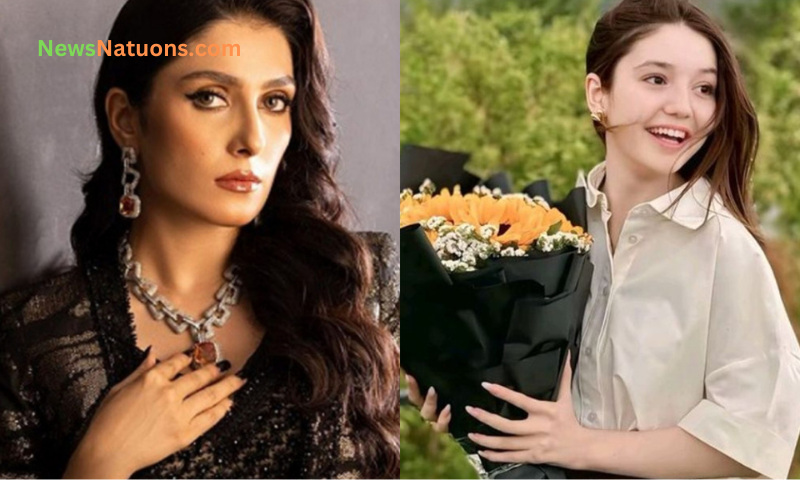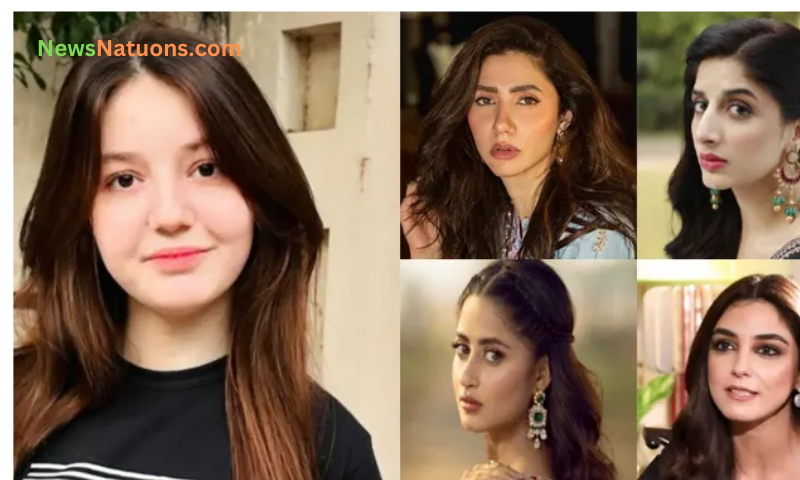The tragic murder of 17-year-old social media influencer Sana Yousuf in Islamabad has left the entire nation in deep sorrow and rage. The brutality of the incident has sparked outrage across the country. From political figures to the entertainment industry, everyone is calling for swift justice. On social media, hashtags demanding punishment for the perpetrators are trending, while the public grieves and shares their frustration over the worsening safety conditions for women and girls in Pakistan.
Ayeza Khan’s Controversial Instagram Message
In the midst of this emotional storm, Pakistani actress Ayeza Khan shared a story on Instagram that sparked a new wave of conversation—and controversy. Her post was intended as a general reminder for followers to practice caution online, but many interpreted it as insensitive and poorly timed.
In her story, Ayeza wrote, “Take care of your privacy. Don’t share your home address, car number, your children’s information, or daily routine on social media—it’s not safe anymore.” She continued, “Times have changed. Your followers are not necessarily people you know—they can be from all over the world.” Her post concluded with a prayer: “May Allah protect us and bless us with good company. Ameen.”
Mixed Reactions: Precaution or Victim Blaming?
While Ayeza’s message was likely shared with good intentions, many felt it implied that victims of violence are somehow responsible for what happens to them based on their social media activity. Critics were quick to point out that Sana Yousuf was a teenager who did nothing to justify what happened to her. To them, Ayeza’s advice came off as tone-deaf during a time when empathy and solidarity were expected from public figures.
Some users accused Ayeza of “victim blaming,” saying her post diverted the focus away from the real issue—the criminal who took an innocent life. One person wrote, “A girl was murdered, and instead of speaking out against the killer, you’re blaming her for sharing her life online?” Another added, “You yourself post vacation pictures and family updates—practice what you preach.”
Criticism Extends to Danish Taimoor
Ayeza’s husband, actor Danish Taimoor, was also dragged into the controversy. Social media users called him out for starring in and producing drama series that often portray violence and toxic relationships. “Maybe start by asking your husband to stop glorifying abuse in dramas before lecturing others,” one comment read. This added another layer to the backlash, turning the spotlight on the broader role the entertainment industry plays in shaping public attitudes towards violence.
Some Defend Ayeza’s Words, But Timing Still Questioned
Not everyone disagreed with Ayeza’s message. A section of her followers defended her, stating that her warning about online privacy was valid and necessary. They argued that in a digital age, people must be more aware of what they share online, especially considering how easily personal information can be misused. However, even some of her supporters admitted that the timing of her post could have been better.
A follower commented, “She’s not wrong about privacy. We do need to be careful. But in the wake of such a tragedy, it’s better to focus on the victim and justice first. This post felt misplaced.” Others echoed similar sentiments, suggesting that Ayeza should have waited or worded her message differently to avoid misinterpretation.
Public Expectations From Celebrities in Times of Crisis
The intense reaction to Ayeza Khan’s story reflects a broader societal trend—people expect celebrities to use their platforms responsibly and sensitively, especially during times of public trauma. When someone of Ayeza’s influence speaks, her words carry weight. Whether it’s intended or not, public figures often shape how the general population processes difficult news. Therefore, when they are perceived as unsympathetic or detached, backlash becomes inevitable.
Learning from the Conversation
The tragic case of Sana Yousuf has opened up multiple layers of public dialogue. Beyond seeking justice for a young life taken too soon, the situation has forced a reckoning with how society discusses victims, crime, and safety—especially on social media platforms. Ayeza Khan’s post, though controversial, has served as a reminder of how delicate these conversations can be.
While her intent may have been cautionary, it highlighted the importance of timing, empathy, and clarity—especially when addressing sensitive topics. Public figures like Ayeza hold powerful voices, and in such moments, the public looks to them not just for awareness, but also for support, unity, and compassion.
اسلام آباد میں 17 سالہ سوشل میڈیا اسٹار ثنا یوسف کا بہیمانہ قتل پورے پاکستان کو غم اور غصے میں مبتلا کر گیا ہے۔ ہر جانب اس بے رحمانہ واقعے کے خلاف آواز بلند ہو رہی ہے۔ سوشل میڈیا پر انصاف کا مطالبہ زور پکڑ رہا ہے، اور ملک بھر میں لوگ قاتل کو سخت سزا دینے کا مطالبہ کر رہے ہیں۔
شوبز انڈسٹری کے کئی نامور ستارے بھی عوام کے ساتھ کھڑے نظر آ رہے ہیں، جنہوں نے ظلم کے خلاف اپنے بیانات دیے ہیں۔ ایسے میں عائزہ خان کی انسٹاگرام اسٹوری نے ایک نئی بحث کو جنم دے دیا ہے۔
عائزہ خان کا محتاط رہنے کا مشورہ یا غیرحساس رویہ؟
اداکارہ عائزہ خان نے اپنی انسٹاگرام اسٹوری پر سوشل میڈیا کے استعمال میں احتیاط برتنے کا مشورہ دیا۔ انہوں نے لکھا، “اپنی پرائیویسی کا خیال رکھیں۔ گھر کا پتہ، گاڑی کا نمبر، بچوں کی معلومات یا روزمرہ کی روٹین سوشل میڈیا پر شیئر نہ کریں، یہ اب محفوظ نہیں رہا۔”
انہوں نے مزید کہا، “وقت بدل چکا ہے۔ آج آپ کے فالوورز وہ نہیں جنہیں آپ نے خود چُنا ہو۔ یہ دنیا بھر سے ہو سکتے ہیں۔” اس پیغام کے آخر میں انہوں نے دعا دی، “اللہ ہمیں اپنی امان میں رکھے اور نیک صحبت نصیب فرمائے، آمین۔”
ردعمل: مشورہ یا الزام؟

عائزہ کا پیغام بظاہر ایک احتیاطی مشورہ تھا، مگر کئی سوشل میڈیا صارفین نے اسے ‘وکٹم بلیمنگ’ قرار دیا۔ ان کا کہنا تھا کہ یہ پیغام اس وقت دینا کہ جب ایک کم عمر لڑکی کا قتل ہوا ہو، انتہائی غیر حساس ہے۔
ایک صارف نے لکھا، “ایک بچی قتل ہو گئی، اور آپ اسے ہی ذمہ دار ٹھہرا رہی ہیں کہ اس نے اپنی معلومات شیئر کیں؟” ایک اور نے طنز کیا، “عائزہ جی، آپ خود اپنی ویکیشن اور فیملی کی تصویریں پوسٹ کرتی ہیں۔ پھر دوسروں کو نصیحت؟”
دانش تیمور پر بھی تنقید
عائزہ خان کے شوہر دانش تیمور بھی اس تنازع میں شامل ہو گئے۔ صارفین نے ان پر تنقید کی کہ وہ ایسے ڈراموں میں کام کرتے ہیں جن میں تشدد، انتقام اور منفی رویوں کو فروغ دیا جاتا ہے۔ ایک تبصرے میں کہا گیا، “پہلے اپنے شوہر کو سمجھائیں کہ تشدد والے ڈرامے بنانا بند کرے، پھر دوسروں کو مشورہ دیں۔”
کچھ لوگوں کی حمایت، مگر وقت پر سوال
اگرچہ بہت سے لوگوں نے عائزہ پر تنقید کی، لیکن کچھ فالوورز نے ان کے پیغام کو سنجیدگی سے لیا اور مانا کہ سوشل میڈیا پر احتیاط ضروری ہے۔ تاہم، ان کا بھی ماننا تھا کہ اس پیغام کا وقت غلط تھا۔
ایک صارف نے لکھا، “بات تو ٹھیک ہے، ہمیں پرائیویسی کا خیال رکھنا چاہیے، لیکن جب ملک میں ایک خوفناک واقعہ پیش آیا ہو، تو ایسے پیغام سے غلط مطلب نکل سکتا ہے۔”
مشہور شخصیات کی ذمہ داری
اس واقعے نے ایک بار پھر اس بات کو واضح کیا ہے کہ مشہور شخصیات سے عوامی توقعات بہت زیادہ ہوتی ہیں۔ لوگ چاہتے ہیں کہ ان کے پسندیدہ اداکار دکھ، غم اور معاشرتی مسائل پر حساس اور ذمہ دار رویہ اپنائیں۔ ایسے نازک لمحات میں الفاظ کا چناؤ، وقت اور انداز سب کچھ اہم ہو جاتا ہے۔
بحث کا مثبت پہلو
اگرچہ عائزہ خان کے بیان پر تنقید ہوئی، لیکن اس بحث نے ایک اہم نکتہ اجاگر کیا: ہمیں نہ صرف اپنی حفاظت پر غور کرنا ہے بلکہ معاشرے میں متاثرہ افراد کے لیے ہمدردی، شعور اور یکجہتی کو فروغ دینا ہے۔
عائزہ کا پیغام نیتاً درست ہو سکتا ہے، مگر اس کا وقت اور سیاق و سباق غلط فہمیاں پیدا کر گیا۔ اس واقعے سے سیکھنے کی بات یہی ہے کہ الفاظ کی طاقت کو سمجھیں، خاص طور پر جب دل دکھے ہوں اور قوم سوگوار ہو۔











